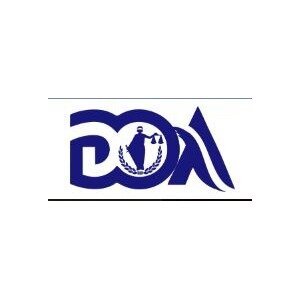Best Structured Finance Lawyers in Ikoyi
Share your needs with us, get contacted by law firms.
Free. Takes 2 min.
List of the best lawyers in Ikoyi, Nigeria
About Structured Finance Law in Ikoyi, Nigeria
Structured finance is a specialized area of finance law that involves the pooling of financial assets and the use of complex legal and financial structures to secure funding, manage risk, and generate liquidity. In Ikoyi, Lagos, a prime business district in Nigeria, structured finance transactions are common among corporations, real estate developers, banks, and investment firms. These deals often include securitizations, project financing, asset-backed securities, collateralized debt obligations, and syndicated loans. The local law firms and professionals in Ikoyi are experienced in navigating both Nigerian legal requirements and international best practices, helping clients structure deals that comply with regulatory frameworks while optimizing financial outcomes.
Why You May Need a Lawyer
Engaging a lawyer who specializes in structured finance in Ikoyi is crucial for several reasons. Whether you are a corporate entity, institutional investor, developer, or financial institution, legal expertise can help you:
- Negotiate and draft complex financing agreements
- Ensure regulatory compliance with Nigerian law and Central Bank directives
- Assess and manage legal risks in asset securitization and other structured deals
- Structure cross-border transactions and navigate foreign currency regulations
- Resolve disputes related to default, enforcement, or restructuring of finance agreements
- Advise on tax implications of structured finance transactions
- Carry out due diligence on counterparties and assets
- Secure approvals from relevant governmental agencies
Legal counsel ensures that your transactions are efficient, legally sound, and can withstand regulatory scrutiny in Ikoyi and beyond.
Local Laws Overview
Structured finance transactions in Ikoyi are governed by a blend of federal and state statutes, regulatory guidelines, and common law principles. Some key aspects include:
- The Companies and Allied Matters Act, which sets the framework for corporate entities involved in structured finance
- The Central Bank of Nigeria (CBN) regulations, which oversee banking, lending, and foreign exchange transactions
- Securities and Exchange Commission (SEC) rules on issuances, disclosures, and trading of asset-backed securities and other investment instruments
- Lagos State land and property laws, crucial for real estate-backed structured finance deals
- The Investments and Securities Act, which provides guidelines on securitizations and the protection of investors
- Tax laws administered by the Federal Inland Revenue Service and Lagos State Internal Revenue Service that impact the structuring of deals
Compliance with these laws is essential to avoid penalties and ensure that structured finance agreements are enforceable in Nigeria.
Frequently Asked Questions
What is structured finance in the Nigerian context?
Structured finance refers to complex financial transactions that go beyond conventional loans, often using asset pooling, securitizations, and bespoke lending structures to raise capital or manage risk.
What types of assets can be securitized in Nigeria?
Commonly securitized assets include mortgages, receivables, car loans, royalties, and lease payments. Legal frameworks exist to support such transactions, provided they comply with Nigerian laws.
Are cross-border structured finance deals allowed in Ikoyi?
Yes, cross-border deals are permitted, but they must comply with both Nigerian regulations and foreign exchange controls set by the Central Bank of Nigeria.
What regulatory approvals are needed for a structured finance transaction?
Approvals may be required from regulatory bodies such as the Securities and Exchange Commission, Central Bank of Nigeria, and sometimes the Nigerian Investment Promotion Commission, depending on the nature of the transaction and assets involved.
What are the typical risks in structured finance deals?
Risks include default by obligors, changes in legal or regulatory frameworks, tax uncertainties, foreign exchange volatility, and potential disputes on asset titles or security interests.
Can individuals participate in structured finance transactions?
Structured finance is primarily designed for corporate entities and large investors, but high-net-worth individuals and family offices may participate, especially through investment vehicles or private placements.
What is the role of a trustee or facility agent in a structured finance deal?
Trustees and facility agents act as intermediaries to protect the interests of investors or lenders, overseeing compliance, managing documentation, and facilitating communication among parties.
How does the law protect investors in structured finance deals?
Investor protection is ensured through mandatory disclosures, corporate governance standards, and rules against misrepresentation, as enforced by the SEC and other regulators.
Is court approval necessary for all structured finance agreements?
Court approval is generally not required unless a dispute arises or judicial enforcement is needed, but agreements must be legally sound to be enforceable in Nigerian courts.
Do tax laws impact the structuring of finance deals in Nigeria?
Yes, taxes on transfers, stamp duties, value-added tax, and withholding tax can significantly impact the economics of a deal. Legal advice can help structure transactions to be tax-efficient and compliant.
Additional Resources
Several organizations and government bodies can assist with information and support for structured finance matters in Ikoyi:
- Securities and Exchange Commission Nigeria
- Central Bank of Nigeria
- Nigerian Bar Association, Lagos Branch
- Lagos State Investment Promotion Agency
- Federal Inland Revenue Service and Lagos State Internal Revenue Service
- Lagos State Special Duties Office (for property and related transactions)
These resources offer regulatory, legal, and administrative guidance relevant to structured finance.
Next Steps
If you need legal assistance in structured finance in Ikoyi, begin by identifying reputable law firms or legal practitioners experienced in this field. Schedule an initial consultation to discuss your specific needs, be it drafting agreements, conducting due diligence, or resolving disputes. Gather all relevant documentation and ensure open communication about your goals and concerns. Keep up-to-date with regulatory developments in Nigeria, as the finance landscape is dynamic. Taking these steps will help you protect your interests and ensure your structured finance transactions are successful and compliant.
Lawzana helps you find the best lawyers and law firms in Ikoyi through a curated and pre-screened list of qualified legal professionals. Our platform offers rankings and detailed profiles of attorneys and law firms, allowing you to compare based on practice areas, including Structured Finance, experience, and client feedback.
Each profile includes a description of the firm's areas of practice, client reviews, team members and partners, year of establishment, spoken languages, office locations, contact information, social media presence, and any published articles or resources. Most firms on our platform speak English and are experienced in both local and international legal matters.
Get a quote from top-rated law firms in Ikoyi, Nigeria — quickly, securely, and without unnecessary hassle.
Disclaimer:
The information provided on this page is for general informational purposes only and does not constitute legal advice. While we strive to ensure the accuracy and relevance of the content, legal information may change over time, and interpretations of the law can vary. You should always consult with a qualified legal professional for advice specific to your situation.
We disclaim all liability for actions taken or not taken based on the content of this page. If you believe any information is incorrect or outdated, please contact us, and we will review and update it where appropriate.










